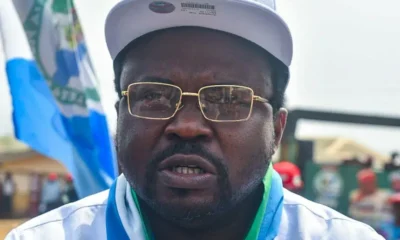News
Ajadi Tasks FG On Improved Operating Environment For Broadcast Industry

A politician and one of the Directors of The Eagle Newsmedia Limited, Ambassador. Olufemi Ajadi, has called on the federal government to improve on the ease of doing business in the country.
He also bemoaned that many broadcast companies were finding it extremely difficult to remain in business in the country.
Ajadi stated these at the Christian Youths in Politics (CYP) international peace conference tagged “A salute to peaceful coexistence in the country” which held today in Lagos.
He said the broadcast industry had made a lot of contributions to national development, but faces a number of challenges such as exchange rate issues, bad economy, poor facilities and ownership structure.

Ajadi who represented the New Nigeria People’s Party (NNPP) as gubernatorial candidate for Ogun State in the last general elections, noted that the unfavorable exchange rate still remained a major challenge to the industry due to the fact that broadcast equipment are imported from overseas.
He pointed out that the harsh economy was the reason why many broadcast stations were struggling as they depended on advert placements to survive.
“On poor facilities, because of lack of finance, many broadcast stations do not have the right equipment to broadcast,” he said.
He also stated that the ownership structure of broadcasting stations had remained a challenge hindering the output of broadcast stations and their ability to generate income.
He however expressed optimism for the industry despite all the challenges.
“I want to state that there are still opportunities for the broadcast industry. The coming of online media has shown that broadcast stations can still explore more grounds. They need to be more innovative, to produce what the viewers want; that way, they are sure of making money.
They can also cut huge costs by using smaller but more efficient equipment,” he advised.
He, however, tasked the government to improve the economy, improve the value of the naira and make it easy for broadcast stations to operate.
“We are over 250 ethnic groups with unique cultures and traditions. This alone is a huge opportunity for the broadcast industry to make an impact. The opportunity to make impact is available, it only requires innovation on the side of broadcast stations to make this count”.
Ajadi said a country with several ethnic languages, cultures, traditions and ideologies, obviously needed a vibrant mass media industry to disseminate these diversities in language and culture.
“This is the task that the Nigerian Mass Media industry has been saddled with, but whether she is playing this role effectively, is a subject of debate,” he stated.
Also speaking, the National president, CYP, Ambassador, Kolawole Princess, described Nigeria as a multi-religious nation with Islam, Christianity and traditional religion as the three dominant religious beliefs.
She said as a religiously plural society, Nigeria always experienced religious fundamentalism and revivalism oriented violence.
“Yes, such has been a feature of the Nigerian state and religious landscape. However By educating ourselves and future generations about tolerance, empathy and the value of diversity, we can break the cycle of hatred and prejudice,” she said.
“As peace is a basic human right, it is very, very important that we embrace this concept in all the possible aspects. For example, peace in policymaking processes, peaceful diplomatic relations with other nations etc,” she urged.
“It is envisioned during this program we shall have better understanding on how to promote peace in our homes, in our community, in our various states as well as the entire country taping from the knowledge of every experienced Dignitaries available with us today,” she added.
On his part, UNESCO Laureate, (HRM) of Duke and Vice Chancellor of Crown International University, represented by Dr. Mojeed Babatunde, listed strategies to adopt peaceful co-existence in the country as promoting tolerance and acceptability across religions.



























